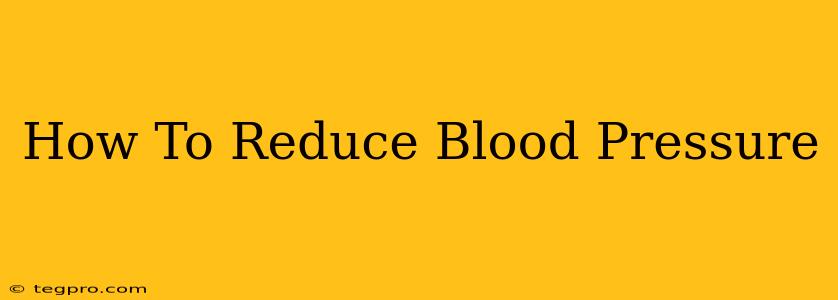High blood pressure, or hypertension, is a silent killer affecting millions worldwide. Understanding how to reduce blood pressure naturally is crucial for maintaining good health and preventing serious complications like heart disease and stroke. This comprehensive guide explores effective lifestyle changes and natural remedies to help you lower your blood pressure and improve your overall well-being.
Understanding Blood Pressure
Before diving into solutions, let's understand what blood pressure is and why it's important to keep it in check. Blood pressure is the force of your blood against your artery walls. It's measured in two numbers: systolic (the top number) and diastolic (the bottom number). High blood pressure is generally defined as readings consistently above 140/90 mmHg.
Lifestyle Changes to Reduce Blood Pressure
Many cases of high blood pressure can be managed, and even reversed, through significant lifestyle modifications. These changes are often the first line of defense and can significantly impact your numbers.
1. Diet Plays a Crucial Role
What to eat:
- Potassium-rich foods: Bananas, spinach, sweet potatoes, and beans help balance sodium levels.
- Magnesium-rich foods: Almonds, dark chocolate, spinach, and avocado support healthy blood vessel function.
- Fruits and vegetables: Packed with vitamins, minerals, and antioxidants. Aim for at least 5 servings daily.
- Whole grains: Opt for whole wheat bread, brown rice, and oats over refined grains.
- Lean protein: Choose fish, poultry, and beans over red meat.
What to avoid:
- Sodium: Limit processed foods, fast food, and salty snacks. Read food labels carefully!
- Saturated and trans fats: Found in red meat, fried foods, and processed snacks.
- Excessive sugar: Contributes to weight gain and inflammation.
- Alcohol: Moderate consumption or abstinence is recommended.
2. Exercise Regularly
Regular physical activity is a cornerstone of blood pressure management. Aim for at least 150 minutes of moderate-intensity aerobic exercise per week, such as brisk walking, jogging, swimming, or cycling. Even short bursts of activity throughout the day can make a difference.
3. Maintain a Healthy Weight
Being overweight or obese significantly increases your risk of high blood pressure. Losing even a small amount of weight can have a positive impact on your blood pressure. Combine a healthy diet with regular exercise for optimal weight management.
4. Manage Stress Effectively
Chronic stress elevates blood pressure. Practice stress-reducing techniques like yoga, meditation, deep breathing exercises, or spending time in nature. Prioritize adequate sleep (7-9 hours per night) for optimal stress management and overall health.
5. Quit Smoking
Smoking damages blood vessels and increases blood pressure. Quitting smoking is one of the best things you can do for your cardiovascular health. Seek support and resources to help you quit successfully.
Natural Remedies to Support Lower Blood Pressure
While lifestyle changes are paramount, certain natural remedies may offer additional support in lowering blood pressure. Always consult your doctor before starting any new supplement regimen.
- Coenzyme Q10 (CoQ10): An antioxidant that may help improve heart function and blood pressure.
- Magnesium: Essential for blood vessel relaxation. Food sources are preferable, but supplements may be considered under medical supervision.
- Omega-3 fatty acids: Found in fatty fish like salmon and flaxseed oil, they may help reduce inflammation and improve blood vessel health.
Monitoring Your Blood Pressure
Regularly monitoring your blood pressure is crucial. Invest in a home blood pressure monitor and track your readings. This allows you to monitor the effectiveness of your lifestyle changes and promptly address any concerning trends. Share your readings with your doctor during regular checkups.
When to See a Doctor
High blood pressure often has no symptoms. Regular check-ups and monitoring are essential for early detection and management. Seek immediate medical attention if you experience sudden, severe headaches, dizziness, shortness of breath, or chest pain.
Disclaimer: This information is for educational purposes only and should not be considered medical advice. Always consult with your doctor or other qualified healthcare professional before making any decisions related to your health or treatment. They can assess your individual needs and recommend the best course of action for managing your blood pressure.

